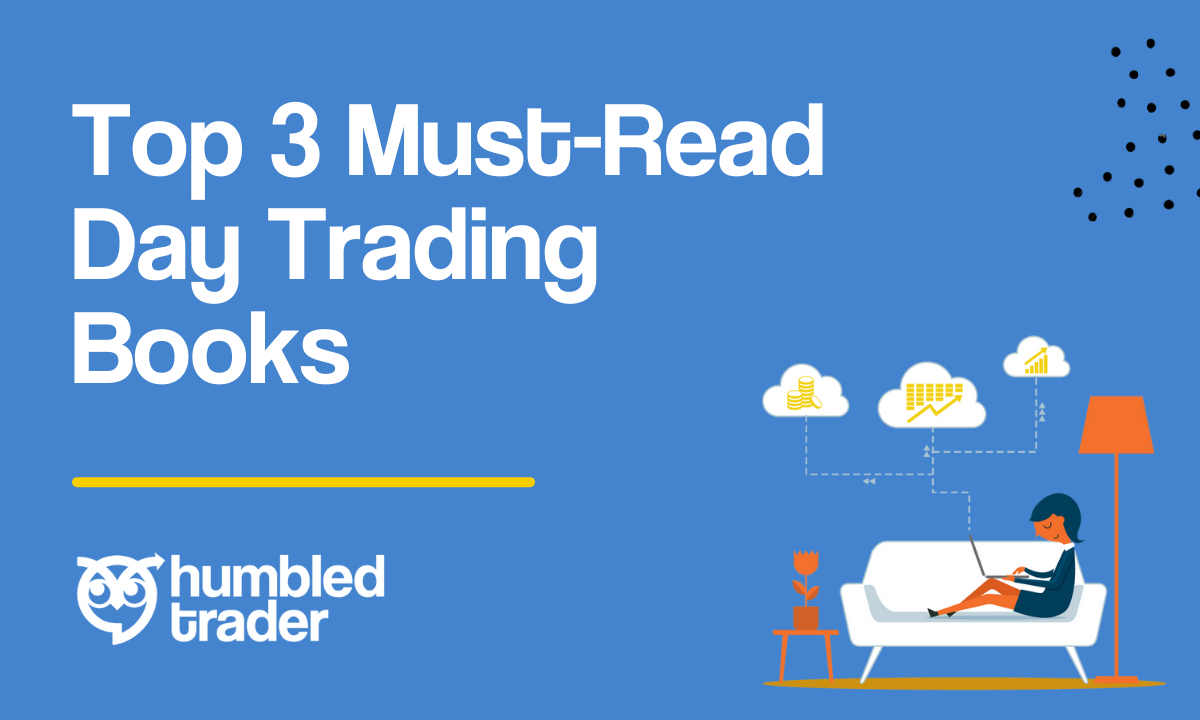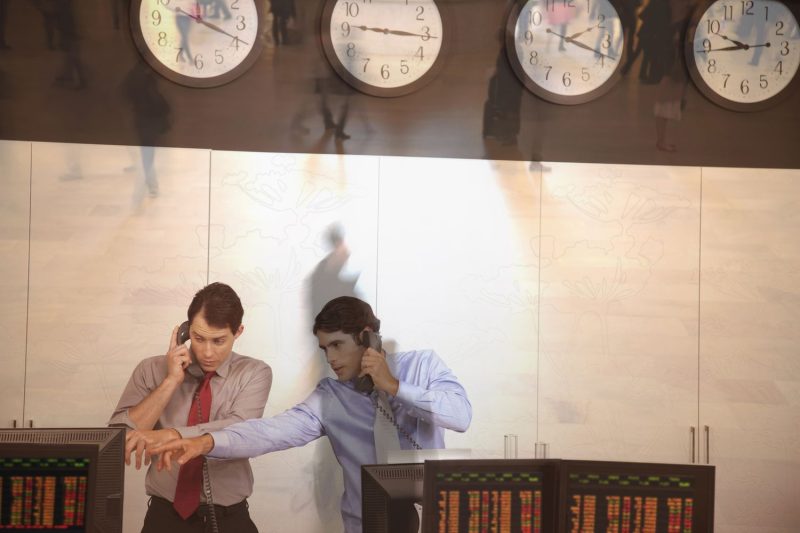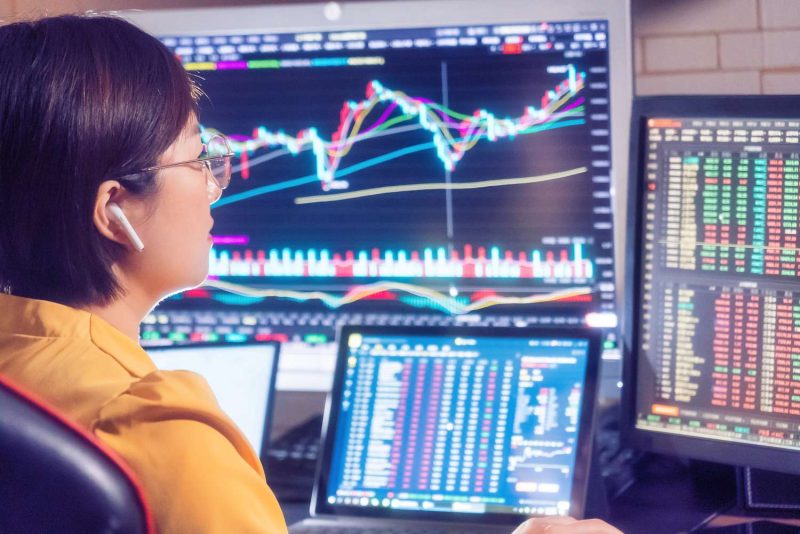Best Day Trading Books For Beginners

Do you want to take advantage of trader psychology, create an emotionless trading system, and improve your own trading discipline? Well, these three books will do exactly that for you.
In the past, I've created many videos discussing risk management, trader psychology, and the importance of avoiding chat room alerts, which can set you back from growing your learning curve by many years.
However, who am I to talk about psychology, risk, and discipline? I don't even have a Lamborghini (Well, according to most day trading marketers out there, I'm not a real trader until I have a few of those.)
So, I must direct your attention to these eye-opening books that have significantly improved my own trading over the years. They are:
Trade the Trader by Quint Tatro,
Trading in the Zone by Mark Douglas
Atomic Habits by James Clear
In this article, I'll summarize the key takeaways from these books and explain how they helped me understand trader psychology, control my emotions while trading, and build good trading discipline.
If that sounds good to you, let's get started!
Trade the Trader by Quint Tatro: Outsmart the Crowd
Trade the Trader, written by Quint Tatro, who is a hedge fund manager and president of his own investment firm in Kentucky, is an insightful book that helps you understand "the other side of the trade" and how to outsmart the crowd at every step. Tatro explains that when trading stocks, you're not just trading companies like Tesla or Apple. You’re actually trading against traders and algorithms on the other side, where people's singular focus is to take your money from your account. It’s a zero-sum game; someone wins and someone loses.
I agree completely with him that most day traders fail because they don't understand this concept. Many new traders spend lots of time and money trying to learn strategies, chart patterns, and a secret indicator to predict market highs and lows. But instead, we should learn to trade against other traders who are trading against us.
Remember, the chart patterns you see on your broker's platforms are just a visual representation of people’s psychological decisions to buy or sell. That’s where we see the big buyers, big sellers, and bag holders on the daily chart.
Therefore, the first step to success as a trader is to learn to trade against the crowd, especially when that crowd is dumb money.
Trading is like playing chess
He compares stock trading to playing chess, where you're not really playing the pawns in front of you but the player on the other side. You need to know the habits and gestures of the other traders and understand exactly when they are triggered.
In this book, Quint Tatro explains the process of understanding the “other side of the trade” and how to outsmart the crowd in every single step. He further explains the concept with excellent guidance on picking the right stocks to trade and getting in and out of stock at the psychological "trigger points,” which are the prices where the other side of the trade is struggling and trying to get out of the trade.
Smart money? Or dumb money?
Recognizing the difference between smart money and dumb money is another key takeaway that Tatro talks about in the book. This is especially true when trading small-cap penny stocks, which are highly dilutive and manipulative for insiders and market makers.
It's easy for them to manipulate these stocks because their market caps are under $100 million, and some are as small as $20 million. This is the "dumb money" from unsuspecting investors—tens of thousands of newsletter and chat room subscriptions—that insiders are trying to move.
Quint also talks about setting trading plans and the art of taking profits and losses. And most importantly, he talks about learning beyond just the basics of technical analysis and overcrowded chart patterns. Instead, we should learn to take advantage of the failure of those basic chart patterns.
There’s just so much insight in this book. I highly recommend it. And this book was a huge inspiration for my trader psychology video and for understanding market cycles. In short, Trade the Trader by Quint Tatro is a must-read for day trading beginners.
Trading in the Zone by Mark Douglas: Build your trader mindset
Trading in the Zone, by Mark Douglas, is an expert in trading psychology, and he has coached hedge fund traders worldwide on controlling the mental side of trading from the inside. In this book, he aims to help you achieve consistency and understand a successful trader's mindset, which he describes as "the Zone."
Just like a professional athlete, great traders are not born, but they are made. They are trained by following strict mental and physical discipline and practicing the same set of routines for years, if not decades. That’s when they’ve truly reached the zone.
Fear is day trading's biggest enemy
First, fear can override all rationality, and I get frustrated with myself when I hesitate due to fear. Sometimes, I even hesitate when I see a setup that I have traded thousands of times in the past and that has a high probability of success.
This psychological fear can stem from taking a loss the day before or not doing enough planning before the trade. Fear can cause us to enter a trade too soon or too late because we are scared of missing out or being wrong.
Second, fear can cause us to cut our winners short because we are scared of the stock changing direction. This can result in us stopping out of a position too soon, only to see the trade we're no longer in turn into a big win.
However, the biggest damage fear can cause is turning a small loss into a huge one. Mark Douglas emphasizes that when you trade with the fear of losing money, you tend to hold on to your position and not stop out when the stock has hit your stop. This "hold and hope" mentality can lead to a significant loss.
This concept is similar to what I discussed in my risk management strategy video. You need to determine the maximum amount of risk you are comfortable with losing if you are wrong. This could be $100 or $1000, depending on what is suitable for your account.
Taking responsibility is the first step to success in day trading
In his book, Mark advises against letting fear or other emotions drive your decision-making when buying or selling during day trading. He emphasizes the importance of taking responsibility for whatever happens.
The market isn’t responsible for your wins and losses; the market merely provides you with opportunities, and it’s your own responsibility to partake only in specific trades you like and to manage your own risk when in the trade. The market doesn’t owe you anything.
So that basically means that if you are right on a trade, great! You worked hard to make that profit; hopefully, it’s a lot bigger than your initial risk. And on the other hand, if your trade fails and you take the planned loss, you traded your plan and took responsibility, and that's totally fine.
But if you do not respect your own stop loss and give into fear and let that loss become 2, 3 times bigger than your max risk, it’s not the market’s fault, it’s not your chat room or DVD’ gurus’ fault either, and you definitely can’t blame your favorite YouTuber who is making free day trading videos for you.
Set up your own trading system to manage your emotions.
When you’re trading in the zone, buy and sell executions should be just like a muscle reflex, an unemotional process in which you are just systematically trading the plan you’ve already prepared before you bought into a stock. Mark Douglas stresses the importance of trading systematically and leaving your emotional responses outside the door.
"Trading in the Zone" has changed the way I approach risk management. Instead of avoiding risk altogether, the book taught me to accept the possibility of risk and choose setups that justify that risk. By executing my plan without emotion, I can better manage my trading emotions. If you are struggling with trading emotions, I highly recommend this book.
Atomic Habits by James Clear: Develop your trading discipline
Atomic Habits, by James Clear, is not a trading book, but it is a book that helped me significantly with my own trading discipline. Clear teaches you how to create positive habits that last.
To succeed in trading, you must have consistent good trading habits, from drawing support and resistance lines and preparing before jumping in to doing your own research, waiting for confirmation, or even just waking up early at least an hour or two before the market opens.
Building a reward and punishment system
Clear offers many tips on creating a routine, such as building a reward and punishment system for yourself, habit stacking, slowly adding your habit goals to your list one by one, and journaling your progress.
Personally, my past reward for making good trading habits was that I got to watch an episode of Game of Thrones because I loved that show (until the last season, which was a disaster), and my form of punishment for making a critical mistake was that I had to run 10 extra minutes when I was doing my workout routine. And man, I hate running!
Keeping a trading journal
Keeping a trading journal is crucial because it allows you to track your progress over the course of a few months or years. From this data, you can identify trading setups and strategies that you are good at and focus on those while avoiding trades that you are terrible at.
You can download a trading journal and risk calculator for free when you sign up for my mailing list below.
Learning to trade alone can be tough
Learning to trade on your own can be challenging and frustrating, especially when it comes to correcting bad habits without guidance. If you want to shorten your learning time and accelerate your progress, consider joining our Humbled Trader Community. Here, you can learn from my 9-year trading journey, including my experiences and mistakes, receive support and advice from peers, and consolidate your trading knowledge.
So you can save time from getting lost and stay laser-focused to grow together as a community!
Check out the course down here to learn more about joining the Humbled Trader Community!
You can find links to all the books I've mentioned today below. Please note that these are Amazon affiliate links, and if you make any purchases through them, I will receive a small commission. It's all going towards my Lamborghini fund, of course.
In addition to reading, you can also listen to books on Audible and sign up for a 30-day free trial. If you have any more trading book recommendations, please let me know in the YouTube video comments below, as I am always looking for new books to read.
Trade the Trader - Understanding the Psychology of the Market.
Trading in the Zone - Risk Management and Approach: Rules, Risk, Set Up, Result.
Atomic Habits - Making Good Trading a Habit.
Don’t feel like reading? Watch the video.



